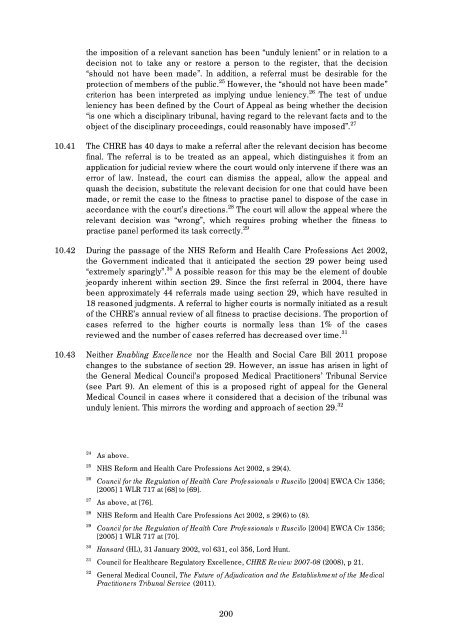Regulation of Health and Social Care Professionals Consultation
Regulation of Health and Social Care Professionals Consultation
Regulation of Health and Social Care Professionals Consultation
Create successful ePaper yourself
Turn your PDF publications into a flip-book with our unique Google optimized e-Paper software.
the imposition <strong>of</strong> a relevant sanction has been “unduly lenient” or in relation to a<br />
decision not to take any or restore a person to the register, that the decision<br />
“should not have been made”. In addition, a referral must be desirable for the<br />
protection <strong>of</strong> members <strong>of</strong> the public. 25 However, the “should not have been made”<br />
criterion has been interpreted as implying undue leniency. 26 The test <strong>of</strong> undue<br />
leniency has been defined by the Court <strong>of</strong> Appeal as being whether the decision<br />
“is one which a disciplinary tribunal, having regard to the relevant facts <strong>and</strong> to the<br />
object <strong>of</strong> the disciplinary proceedings, could reasonably have imposed”. 27<br />
10.41 The CHRE has 40 days to make a referral after the relevant decision has become<br />
final. The referral is to be treated as an appeal, which distinguishes it from an<br />
application for judicial review where the court would only intervene if there was an<br />
error <strong>of</strong> law. Instead, the court can dismiss the appeal, allow the appeal <strong>and</strong><br />
quash the decision, substitute the relevant decision for one that could have been<br />
made, or remit the case to the fitness to practise panel to dispose <strong>of</strong> the case in<br />
accordance with the court’s directions. 28 The court will allow the appeal where the<br />
relevant decision was “wrong”, which requires probing whether the fitness to<br />
practise panel performed its task correctly. 29<br />
10.42 During the passage <strong>of</strong> the NHS Reform <strong>and</strong> <strong>Health</strong> <strong>Care</strong> Pr<strong>of</strong>essions Act 2002,<br />
the Government indicated that it anticipated the section 29 power being used<br />
“extremely sparingly”. 30 A possible reason for this may be the element <strong>of</strong> double<br />
jeopardy inherent within section 29. Since the first referral in 2004, there have<br />
been approximately 44 referrals made using section 29, which have resulted in<br />
18 reasoned judgments. A referral to higher courts is normally initiated as a result<br />
<strong>of</strong> the CHRE’s annual review <strong>of</strong> all fitness to practise decisions. The proportion <strong>of</strong><br />
cases referred to the higher courts is normally less than 1% <strong>of</strong> the cases<br />
reviewed <strong>and</strong> the number <strong>of</strong> cases referred has decreased over time. 31<br />
10.43 Neither Enabling Excellence nor the <strong>Health</strong> <strong>and</strong> <strong>Social</strong> <strong>Care</strong> Bill 2011 propose<br />
changes to the substance <strong>of</strong> section 29. However, an issue has arisen in light <strong>of</strong><br />
the General Medical Council’s proposed Medical Practitioners’ Tribunal Service<br />
(see Part 9). An element <strong>of</strong> this is a proposed right <strong>of</strong> appeal for the General<br />
Medical Council in cases where it considered that a decision <strong>of</strong> the tribunal was<br />
unduly lenient. This mirrors the wording <strong>and</strong> approach <strong>of</strong> section 29. 32<br />
24 As above.<br />
25 NHS Reform <strong>and</strong> <strong>Health</strong> <strong>Care</strong> Pr<strong>of</strong>essions Act 2002, s 29(4).<br />
26<br />
Council for the <strong>Regulation</strong> <strong>of</strong> <strong>Health</strong> <strong>Care</strong> Pr<strong>of</strong>essionals v Ruscillo [2004] EWCA Civ 1356;<br />
[2005] 1 WLR 717 at [68] to [69].<br />
27 As above, at [76].<br />
28 NHS Reform <strong>and</strong> <strong>Health</strong> <strong>Care</strong> Pr<strong>of</strong>essions Act 2002, s 29(6) to (8).<br />
29<br />
Council for the <strong>Regulation</strong> <strong>of</strong> <strong>Health</strong> <strong>Care</strong> Pr<strong>of</strong>essionals v Ruscillo [2004] EWCA Civ 1356;<br />
[2005] 1 WLR 717 at [70].<br />
30 Hansard (HL), 31 January 2002, vol 631, col 356, Lord Hunt.<br />
31 Council for <strong>Health</strong>care Regulatory Excellence, CHRE Review 2007-08 (2008), p 21.<br />
32<br />
General Medical Council, The Future <strong>of</strong> Adjudication <strong>and</strong> the Establishment <strong>of</strong> the Medical<br />
Practitioners Tribunal Service (2011).<br />
200
















